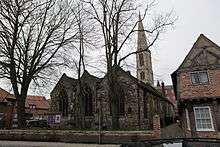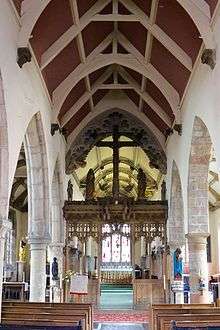All Saints' Church, North Street, York
| All Saints’ Church, North Street, York | |
|---|---|
 All Saints’ Church, North Street, York | |
| Coordinates: 53°57′30.4″N 1°5′10.3″W / 53.958444°N 1.086194°W | |
| Location | York |
| Country | England |
| Denomination | Church of England |
| Churchmanship | Traditional Catholic |
| Website | allsaints-northstreet.org.uk |
| History | |
| Dedication | All Saints |
| Architecture | |
| Heritage designation | Grade I listed[1] |
| Administration | |
| Parish | All Saints, North Street, York |
| Deanery | York |
| Archdeaconry | York |
| Diocese | Diocese of York |
| Province | Province of York |
All Saints’ Church, North Street, York is a Grade I listed[1] parish church in the Church of England in York.[2]
History

The earliest part of the church is the nave dating from the 12th century. The arcades date from the 13th century and the east end was rebuilt in the 14th century, when the chancel chapels were added.
An anchorite building was erected at the west end in the fifteenth century and a squint made through the wall so that Dame Emma Raughton could observe and hear the mass being said. This was rebuilt in 1910.
The church was restored between 1866 and 1867 by JB and W Atkinson of York, which included the rebuilding of the south aisle wall, the addition of a porch and a vestry, half of the roof being replaced, new seating provided throughout, the pillars and walls scraped, and a new organ provided[3] The masonry work was done by Mr. Brumby of Skeldergate, the carpentry by Mr. Dennison, the plumbing and glazing by Messrs. Hodgson and the painting by Mr. Lee of Gillygate. The chancel ceiling and reredos were decorated by Mr. Knowles. The chancel was laid with Minton tiles. The total cost of the restoration, including the new organ, was £1,500 (equivalent to £119,782 in 2015).[4]
The pulpit dates from 1675.
The chancel screen was installed in 1906, and designed by Edwin Ridsdale Tate. he also rebuilt the anchorites house in 1910. The church was restored again in 1991 by the architect Peter Marshall.
Stained glass
The church is noted as containing the finest collection of medieval glass in York, mostly dating from the early 14th century. [1] Perhaps the most famous is that depicting the Prick of Conscience dating from ca. 1410.[5]
From the north aisle, the windows are
- A set of 15th century coats of arms
- The St Thomas window dating from ca. 1410
- The Corporal Acts of Mercy dating from ca. 1410
- The Prick of Conscience window dating from ca. 1410
- The Lady Chapel east window dating from ca. 1330
- The Chancel east window dating from ca. 1410
- The south aisle east window dating from ca. 1350
- The St Michael and St John window dating from ca. 1430
- The Nine Orders of Angels window dating from ca. 1410
- The St James window dating from ca 1410
-

The Coats of Arms window
-

The St Thomas window
-

The Corporal Acts of Mercy window
-

The Prick of Conscience window
-

The Lady Chapel east window
-

The great east window
-

The South aisle east window
-

The St Michael and St John window
-

The Nine Orders of Angels window
-

The St James' window
Memorials
- John Etty (d. 1709)
- Revd. John Stoddart
- Joan Stoddart (d. 1599)
- James Pennyman (d. 1699)
- Joshua Witton (d. 1674).
- William Stockton (d. 1471)
- Robert Colynson (d. 1458)
- Thomas Clerk (d. 1482)
- Thomas Askwith (d. 1609)
- Charles Townley (d. 1712)
Organ
The pipe organ was built by Forster and Andrews and dates from 1867. A specification of the organ can be found on the National Pipe Organ Register.[6]
References
- 1 2 3 Historic England. "Church of All Saints with Anchorage Attached (Grade I) (1257067)". National Heritage List for England. Retrieved 5 May 2015.
- ↑ The Buildings of England. York and the East Riding. Nikolaus Pevsner and David Neave. Yale University Press. 1995. ISBN 0300095937
- ↑ "Restoration and Re-opening of All Saints Church, North Street". York Herald. York. 18 May 1867. Retrieved 5 May 2015.
- ↑ UK CPI inflation numbers based on data available from Gregory Clark (2016), "The Annual RPI and Average Earnings for Britain, 1209 to Present (New Series)" MeasuringWorth.
- ↑ Roger Rosewell, 'The Pricke of Conscience or the Fifteen Signs of Doom Window in the Church of All Saints, North Street, York', Vidimus, 45 (n.d.), http://vidimus.org/issues/issue-45/feature/
- ↑ "NPOR D05798". National Pipe Organ Register. British Institute of Organ Studies. Retrieved 5 May 2015.